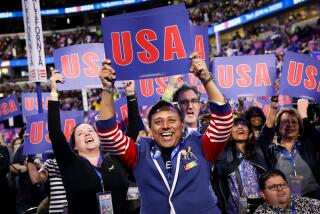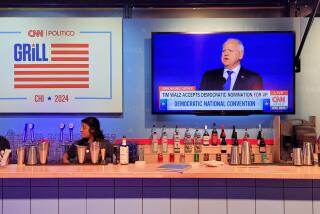Putting Party’s Spin on Coverage
- Share via
NEW YORK — Anyone looking for evidence that American political conventions have completed their transformation from unpredictable news events to wholly packaged spectacles should check out some of the people doing stand-ups from the floor of the Republican National Convention here this week.
Mixed in among the political reporters are people like Christine Iverson. She and her four colleagues -- dubbed “CJs,” short for “convention jockeys” -- appear to be one part slick “American Idol”-style emcee and one part hyperenthusiastic local TV news reporter (a job Iverson once held with an ABC affiliate.)
But in a transformation that represents a new wrinkle in the evolution of communication and politics, the CJs actually work for the GOP. Iverson is a spokeswoman for the Republican National Committee when she isn’t interviewing the president of New York’s police sergeants union about his group’s endorsement of the president.
The CJs’ role is to break up the parade of official speakers, taking the action down into the sea of delegates and interjecting unpredictability with live, albeit pre-planned, interviews. They also introduce the bands, the speakers and the pre-taped videos. Delegates in the hall see them on giant video screens.
Outside Madison Square Garden, the CJs can be seen primarily on cable’s unfiltered C-SPAN network, where they make the convention seem more like a regular TV show and less like an official proceeding.
While other networks have steered clear of the CJ reports, C-SPAN viewers are seeing them in full. A C-SPAN spokeswoman said, “The RNC produces the program, and all we’re there to do is cover it.” Iverson could not be reached for comment.
It’s unlikely anyone would confuse the CJs with real reporters, although their style is reminiscent of the fawning celebrity interviewers on some entertainment newsmagazines.
CJ Rori Patrise Smith, otherwise a convention spokeswoman, wore a spangled sleeveless stars-and-stripes top as she presented a live report from a Milwaukee firefighters’ unit.
CJ Yohana de la Torre, the RNC’s outreach media coordinator and a former sports reporter for an NBC affiliate -- faked an interruption as she interviewed Bill Harris, the convention’s chief executive officer. That allowed him to segue into a “Saturday Night Live” imitation and open Monday night’s proceedings with a shout of: “Live from New York, it’s the Republican National Convention!”
Sometimes their set-up questions and follow-ups suggest the CJs are not from the hard-news school of interviewing. “We really appreciate the honor and the service you have given to this country,” CJ Mercedes Viana Schlapp told her West Virginia delegate-interviewee. Schlapp, who served two years as the president’s Spanish-language spokeswoman, added, “We salute you, Hiram; we salute our troops!”
While carefully crafted personal videos of candidates, produced by the campaigns, have been grudgingly aired by at least some TV news outlets as part of their convention coverage, the CJ reports haven’t met with the same acceptance.
PBS isn’t using them in its three hours of nightly convention coverage, nor is CNN or MSNBC. “It’s a contrivance to appear as a journalistic enterprise,” said Les Crystal, the executive producer of PBS’ coverage. “You have people being, quote, interviewed, and so to us it was almost obvious” to decide not to carry them, he said.
He added that while he didn’t want to demean the delegates being interviewed, “we’re looking for people of substance who have substantive things to say.”
ABC News Now, the network’s extended digital and broadband coverage, showed some of the CJ reports, identified as RNC video, to “give viewers a sense of what the party is doing to project its message,” a spokesman said.
Anchor Peter Jennings noted at one point: “That young woman is a reporter only in the sense that she is a reporter for the Republican National Committee ... but at this and other conventions, Republicans particularly, but also Democrats, have thought that using the model of the news business has worked effectively for them.”
Conventions “are changing into message festivals that actually go out over many different media,” said Jay Rosen, chairman of New York University’s journalism department, adding that the political parties increasingly produce them as “entertainment spectacles, programming them as a pageant, [or] a Super Bowl show.”
More to Read
Get the L.A. Times Politics newsletter
Deeply reported insights into legislation, politics and policy from Sacramento, Washington and beyond. In your inbox twice per week.
You may occasionally receive promotional content from the Los Angeles Times.










